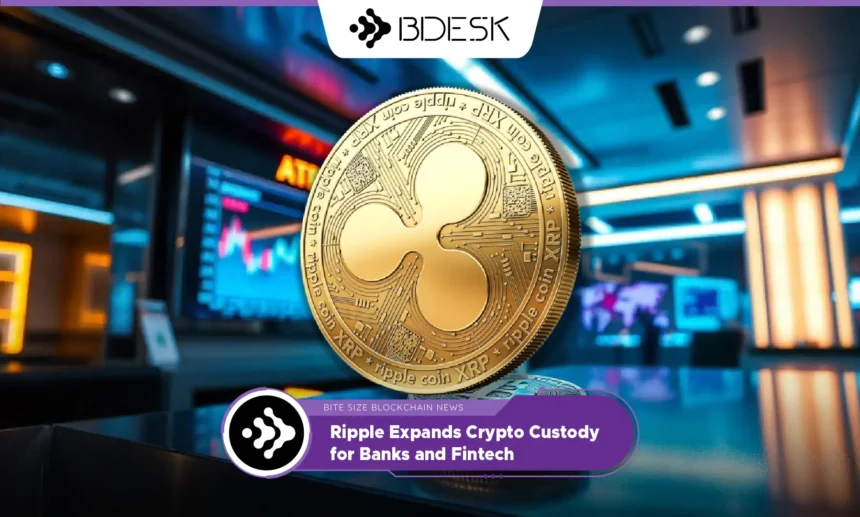Ripple’s new features aim to support banks and fintech firms in securely storing and managing digital assets, enhancing its presence in crypto custody.
Ripple Ventures into Crypto Custody Services
Ripple has launched new services targeting banks and fintech firms. These features focus on helping these institutions store digital assets securely. This marks a significant move in Ripple’s strategy to broaden its business, stepping beyond its renowned XRP cryptocurrency and payment services.
A Comprehensive Crypto Custody Solution
The San Francisco-based blockchain company has introduced Ripple Custody, a service that offers pre-configured operational settings, policy integration, and an improved user interface. Its XRP Ledger blockchain platform also supports these services, allowing clients to handle digital tokens more efficiently.
Ripple’s Push for Diversification
With its recent launch, Ripple is expanding into a market dominated by competitors like Coinbase, Gemini, and Fireblocks. The company is evolving its business by moving into crypto custody, a growing sector that includes payment settlement and compliance solutions.
The Role of Custodians in Digital Assets
Crypto custody services are crucial in managing the security of digital assets. Custodians secure private keys, making them essential players in the broader crypto market. Its new services ensure clients can access trading, payments, and compliance features, adhering to global regulations.
Market Potential for Crypto Custody
According to Boston Consulting Group, the crypto custody market is projected to grow significantly, potentially reaching $16 trillion by 2030. Ripple’s expansion into this field allows the company to capitalize on the growing need for secure digital asset storage solutions.
Future Prospects for Ripple Custody
Ripple Custody’s client list has grown by 250% over the past year. Operating in over 20 countries, the service supports major institutions like HSBC and Societe Generale. Ripple believes that as more real-world assets become tokenized, there will be increased demand for custody services, which is why they allow customers to tokenize assets through their XRP Ledger technology.
Real-World Asset Tokenization
Tokenization of real-world assets is part of Ripple’s vision for the future. Clients can now use the XRP Ledger to tokenize assets like currencies, real estate, or commodities, facilitating faster and cheaper trades.
Securing the Future of Digital Assets
Aaron Slettehaugh, the Senior Vice President of Product, stated that the company’s new custody features will help serve high-growth fintech businesses. The company aims to make digital asset management secure and scalable, particularly as the industry grows rapidly.
Ripple’s Strategic Acquisitions
Last year, Ripple acquired Metaco, a company specializing in crypto custody services. This acquisition, along with Ripple’s buyout of Standard Custody & Trust Company, further strengthens its custody capabilities and positions it to offer comprehensive digital asset storage solutions.
Ripple Navigating Legal Challenges
Ripple’s latest venture comes at a challenging time for XRP. The U.S. Securities and Exchange Commission recently filed an appeal to classify XRP as a security. Despite legal battles, Ripple continues to focus on expanding its business and offering innovative solutions in the crypto industry.
Disclaimer:
The information provided on 13Desk is for informational purposes only and should not be considered financial advice. We strongly recommend conducting your own research and consulting with a qualified financial advisor before making any investment decisions. Investing in cryptocurrencies carries risks, and you should only invest what you can afford to lose. 13Desk is not responsible for any financial losses incurred from your investment activities.











